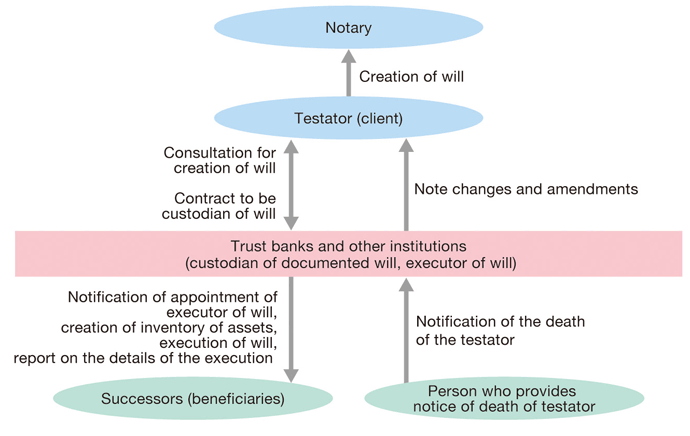Family trusts·Inheritance - related operations
The accumulation of assets by the elderly and an increase in the number of nuclear families heightened the focus on family trusts and inheritance-related operations as an effective asset succession strategy.
Trust banks and other institutions respond to such needs through family trusts, "testamentary-trust business" that administers everything from custody of wills to execution of the requests concerning willed assets, and inheritance-related operations that involve the listing of inherited property and procedures for distributing such assets. There are family trusts called "testamentary substitute trusts" that appoint the settlor as the beneficiary as long as he is alive, and his child or spouse becomes the beneficiary following his death. There are also "successive life interest trust" that appoint the settlor as the beneficiary as long as he is alive, and his spouse becomes the beneficiary following his death. After the death of the spouse, the child becomes the beneficiary.
Testamentary-trust business

- Trust banks and other institutions provide consultation to the testator concerning the creation of a will.
- The testator creates a will.
In principle, a notarial will is created, whereby a notary creates the original and holds it at the notary office to prevent forgeries and loss. - The testator enters into an agreement with the trust banks and other institutions concerning custody of the will.
- Trust banks and other institutions question the testator regarding the need to amend or change the assets and other issues.
- When the testator dies, the person providing notice of death notifies the trust banks and other institutions of the testator's death.
- Trust banks and other institutions disclose the wills that they hold in custody and decide whether they will become the executor. If they assume the role of executor, they create a list of assets and provide it to the heirs. They then undertake all necessary actions to execute the will, such as the management and disposal of assets and settlement of debts. Once concluded, they create a report on the execution of the will.
Types of trusts | Money trusts & Loan trusts | Investment trusts | Family trusts·Inheritance - related operations | Real estate trusts·Real estate business | Pension trusts | Asset formation trusts | Asset securitization type trust(monetary claims trusts, real estate trusts) | Securities trusts | Securities trusts (specified money trusts, fund trusts) | Stock Transfer Agencies | Charitable trusts | Specified donor trusts | Product expectations







